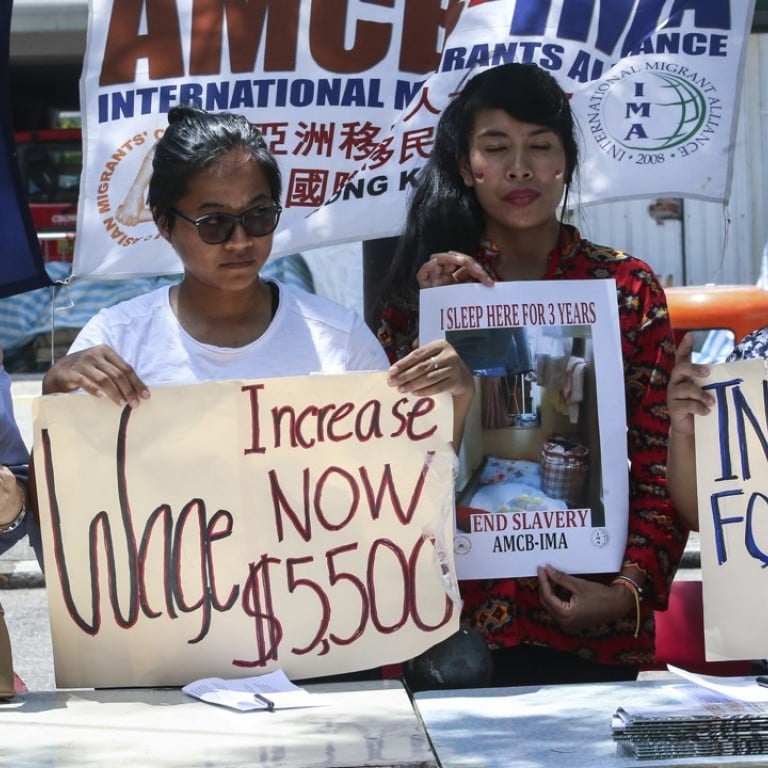
First Cambodia, where next? Hong Kong ‘may open door’ to more foreign helpers
Chief Secretary Matthew Cheung says the domestic workers could be trained to care for growing elderly population
Hong Kong needs to consider bringing in domestic workers from more countries and train them in caring for the elderly to combat the challenges arising from an ageing population, the city’s No 2 official says.
Chief Secretary Matthew Cheung Kin-chung made the remarks in his blog on Sunday, the same day as helpers’ representatives called on the government to raise their monthly minimum wage from HK$4,310 to HK$5,500.
Cheung said there were 40,000 households in Hong Kong where domestic workers were the only ones living with and taking care of the elderly. By 2041, one in three city residents will be aged 65 or above, implying a huge demand for elderly care services.
Language issues for incoming Cambodian domestic helpers spark concern in Hong Kong
“In the long run, should we speed up studies on expanding the sources and numbers of domestic workers from regions that have similar cultures with Hong Kong? Should home nursing training for foreign domestic workers be beefed up?” wrote Cheung, formerly the labour and welfare minister.
There are currently around 320,000 foreign domestic helpers in the city, mostly from the Philippines and Indonesia, and a small number from Thailand.
The Hong Kong government does not allow anyone from Vietnam, mainland China, Macau, Taiwan, Afghanistan, Cuba, Laos, North Korea or Nepal to work as domestic helpers in the city.
The Security Bureau said earlier the government had imposed the policy after careful consideration of various factors, including the immigration and security risks posed by nationals of the countries and their social, economic and political conditions.
Confusion lingers over proposals for Filipino domestic helpers entering China
Cambodia was recently removed from the list and the first group of about 1,000 maids are expected to arrive in one or two months.
According to official figures, the number of Hong Kong residents aged 65 and above rose from 10.3 per cent of the population in 1997 to 16 per cent in 2016, pushing the number to more than a million. This figures will soar to 24 per cent by 2025 and by 2041 almost one in three will be elderly.
Undersecretary for Labour and Welfare Caspar Tsui Ying-wai told the Post on Sunday that the government had been “constantly” reviewing whether Hong Kong could bring in domestic workers from more countries.
“The demand for domestic workers in Hong Kong is huge. Is it enough to just rely on Indonesia and the Philippines?” he said, pointing to the recent lifting of the ban on Cambodia.
If China is offering better wages than what Hong Kong is offering, why would people still work in Hong Kong
Eman Villanueva, spokesman of the Asian Migrants’ Coordinating Body, said the city was becoming a less attractive place for domestic workers because of the low wages and long working hours.
“Mainland China will soon open up its market for domestic workers. If China is offering better wages than what Hong Kong is offering, why would people still work in Hong Kong?” he asked.
He was referring to talks between mainland China and the Philippines to allow Filipinos work as maids on the mainland.
Villanueva said he favoured domestic workers being offered training to care for the elderly because at the moment they were only taught to look after children before they came to Hong Kong.
“The government should provide the training for free. Those who need to take care of the elderly should be given a minimum wage higher than the other domestic workers,” he said.
Enough is enough: Hong Kong must seek alternatives to foreign domestic helpers
Quoting figures from the Philippines consulate, Villanueva said that 114 Filipinos died of natural deaths last year in Hong Kong, including 29 from strokes, 24 from cancers, nine from tuberculosis or lung diseases. The figures do not include deaths from accidents.
“They died of stress-related diseases,” he said.
Vietnam’s consul general in Hong Kong, Hoang Chi Trung, said in an 2015 interview that he had lobbied the Hong Kong government to allow Vietnamese to work as domestic workers in the city. He said at the time he hoped that could happen by 2017.
Trung believed the ban was imposed because of problems caused by an influx of Vietnamese refugees in the 1970s and 1980s. During those years, about a quarter of a million Vietnamese reportedly fled to Hong Kong after the Vietnam war.
Riots were common. In 1995, thousands of Vietnamese refugees rioted while being transferred from one camp to another, injuring 200 police and refugees.

